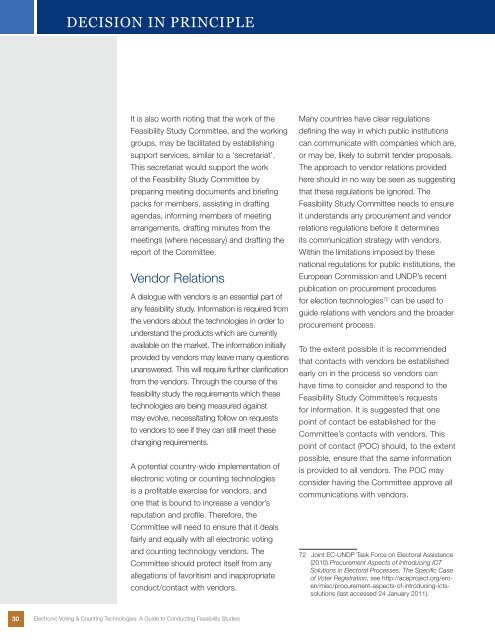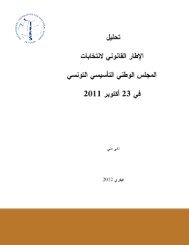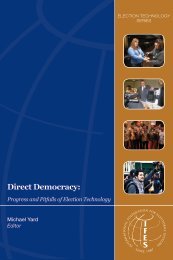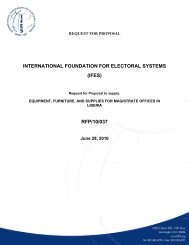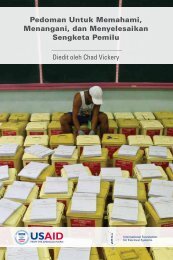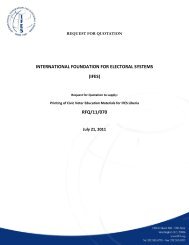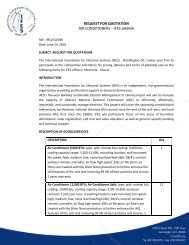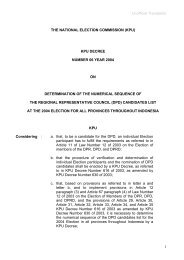Electronic Voting & Counting Technologies - IFES
Electronic Voting & Counting Technologies - IFES
Electronic Voting & Counting Technologies - IFES
- No tags were found...
Create successful ePaper yourself
Turn your PDF publications into a flip-book with our unique Google optimized e-Paper software.
INTERNATIONAL DECISION PRINCIPLEELECTORAL STANDARDSIt is also worth noting that the work of theFeasibility Study Committee, and the workinggroups, may be facilitated by establishingsupport services, similar to a ‘secretariat’.This secretariat would support the workof the Feasibility Study Committee bypreparing meeting documents and briefingpacks for members, assisting in draftingagendas, informing members of meetingarrangements, drafting minutes from themeetings (where necessary) and drafting thereport of the Committee.Vendor RelationsA dialogue with vendors is an essential part ofany feasibility study. Information is required fromthe vendors about the technologies in order tounderstand the products which are currentlyavailable on the market. The information initiallyprovided by vendors may leave many questionsunanswered. This will require further clarificationfrom the vendors. Through the course of thefeasibility study the requirements which thesetechnologies are being measured againstmay evolve, necessitating follow on requeststo vendors to see if they can still meet thesechanging requirements.A potential country-wide implementation ofelectronic voting or counting technologiesis a profitable exercise for vendors, andone that is bound to increase a vendor’sreputation and profile. Therefore, theCommittee will need to ensure that it dealsfairly and equally with all electronic votingand counting technology vendors. TheCommittee should protect itself from anyallegations of favoritism and inappropriateconduct/contact with vendors.Many countries have clear regulationsdefining the way in which public institutionscan communicate with companies which are,or may be, likely to submit tender proposals.The approach to vendor relations providedhere should in no way be seen as suggestingthat these regulations be ignored. TheFeasibility Study Committee needs to ensureit understands any procurement and vendorrelations regulations before it determinesits communication strategy with vendors.Within the limitations imposed by thesenational regulations for public institutions, theEuropean Commission and UNDP’s recentpublication on procurement proceduresfor election technologies 72 can be used toguide relations with vendors and the broaderprocurement process.To the extent possible it is recommendedthat contacts with vendors be establishedearly on in the process so vendors canhave time to consider and respond to theFeasibility Study Committee’s requestsfor information. It is suggested that onepoint of contact be established for theCommittee’s contacts with vendors. Thispoint of contact (POC) should, to the extentpossible, ensure that the same informationis provided to all vendors. The POC mayconsider having the Committee approve allcommunications with vendors.72 Joint EC-UNDP Task Force on Electoral Assistance(2010) Procurement Aspects of Introducing ICTSolutions in Electoral Processes: The Specific Caseof Voter Registration, see http://aceproject.org/eroen/misc/procurement-aspects-of-introducing-ictssolutions(last accessed 24 January 2011).30<strong>Electronic</strong> <strong>Voting</strong> & <strong>Counting</strong> <strong>Technologies</strong>: A Guide to Conducting Feasibility Studies


